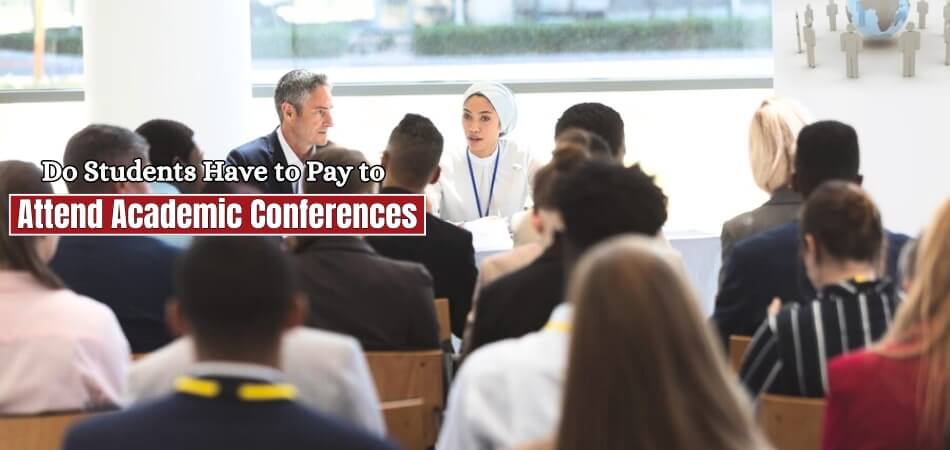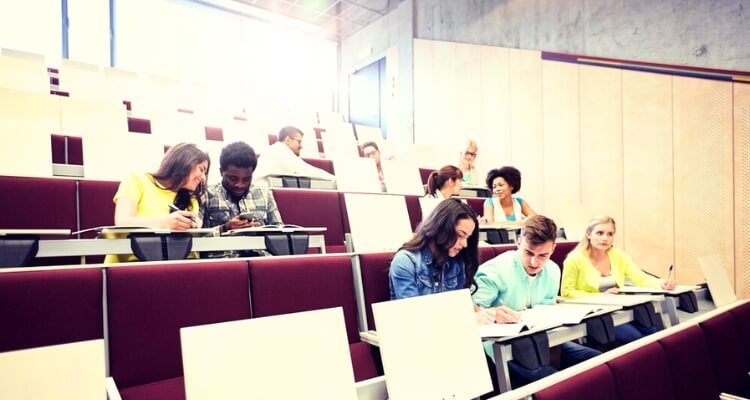Academic conferences offer students a chance to connect with experts, expand knowledge, and explore career paths. But a question often arises, do students have to pay to attend academic conferences? Being aware of the costs can be crucial when planning to attend one.
The answer depends on various factors, such as the type of conference, location, and whether sponsorships or scholarships are available. Some conferences offer student discounts or even free passes, but others may require a fee for participation.
Curious about what these costs entail and how to make the most of conference experiences as a student? Read on to discover the financial aspects, potential funding sources, and tips to minimize expenses while gaining the maximum benefits from attending academic conferences.
What Are the Purpose of Academic Conferences?
Academic conferences serve as vibrant platforms for knowledge exchange and professional development. They bring together scholars, researchers, and students to collaborate, learn, and explore new ideas. Here’s a closer look at their core purposes:
Sharing Research Findings
One of the primary purposes of academic conferences is to share research findings. Presenters showcase their latest studies, offering insights into current trends and discoveries. This exchange not only spreads knowledge but also inspires attendees to explore new areas of research.
Networking Opportunities
Academic conferences create invaluable networking opportunities. Participants meet like-minded individuals, renowned experts, and potential collaborators in their field. Whether attending conferences in Canada, the United States, Europe, or other regions, researchers often form long-term professional relationships, joint projects, or even career opportunities.
Learning from Experts
Conferences allow attendees to learn directly from subject-matter experts. Keynote speakers and panelists present in-depth analyses and perspectives that can’t be found in textbooks. This experience enriches understanding and exposes students and researchers to various viewpoints and innovative ideas.
Developing Presentation Skills
Presenting at academic conferences helps attendees refine their public speaking and communication skills. Delivering complex ideas to an audience requires clarity and confidence, which are vital skills for career advancement. This experience also builds personal confidence, making future presentations easier.
Staying Updated on Research Trends
Conferences offer insights into the latest trends and breakthroughs in academia. Attendees can learn about the latest research areas, innovative methodologies, and future challenges. Staying updated helps scholars and students align their work with current developments in their fields.
So, academic conferences play a significant role in both personal and professional growth. They are more than just gatherings—they are stepping stones for anyone seeking to expand their horizons in academia.
Do Students Have to Pay to Attend Academic Conferences?
Yes, students usually have to pay to attend academic conferences, as most require a registration fee. However, some offer student discounts or even free admission. Additional costs may include travel, accommodation, and food, but scholarships and university grants can help cover expenses.
However, there are ways to make attending these events more affordable through scholarships, travel grants, or funding from universities. Here are the primary areas where students might affect costs:
Registration Fees
Registration is typically the first cost that students encounter. Depending on the conference, these fees can range from modest to quite expensive.
Many conferences offer student discounts, making it more affordable, but students should still budget for this expense. In some cases, early bird registrations come at a lower price, so planning ahead can help reduce costs.
Travel Expenses

Before making arrangements, students should also focus on getting permission to attend conferences, as universities often require formal approval for travel grants and financial aid. Choosing budget-friendly travel options or carpooling with other attendees can also reduce costs.
Accommodation Costs
For multi-day conferences, students will likely need a place to stay. Accommodation costs can add up quickly, especially in major cities. To save money, students can consider staying in hostels, sharing rooms with other attendees, or opting for Airbnb rentals.
Some conferences also partner with nearby hotels to offer discounted rates for participants, making it easier to find budget-friendly options.
Food and Daily Expenses
While some conferences include meals, many do not. Students should plan to spend on food, beverages, and other daily expenses like transportation to and from the conference venue.
Packing snacks, eating at affordable local spots, and setting a daily budget can help students manage their expenses without feeling the financial strain.
Materials and Preparation
Depending on the conference type, students might need to pay for materials such as poster printing, handouts, or business cards. These costs may seem small, but they can add up. Preparing these materials in advance or seeking support from academic departments can help minimize these costs.
Attending academic conferences can be a valuable investment in a student’s future, but it’s important to plan and budget wisely. By identifying the potential costs and exploring available financial support, students can make the most of these opportunities without breaking the bank.
How Can Students Reduce Their Conference Costs?
The cost of attending conferences can be high for students, but there are ways to minimize the expense. By planning ahead and making strategic choices, students can make the experience more affordable while still reaping the benefits of professional development.
Apply for Student Discounts
Many conferences offer discounted registration fees for students. These discounts can be significant and often make a difference in your budget. Keep an eye out for early bird discounts, which are often lower than standard student rates.
Share Accommodation
Accommodation can be one of the biggest expenses. Students can reduce this cost by sharing a room with fellow attendees or staying in hostels. Booking in advance or choosing budget-friendly options like Airbnb can further help save money.
Seek Travel Grants
Many universities and professional associations offer travel grants specifically for conference attendees. Applying for these grants requires some effort, but they can cover a substantial portion of travel expenses. The key is to apply early and ensure your application aligns with the funder’s requirements.
Use Public Transportation
Using public transportation instead of taxis or rideshares can help reduce costs. Research the local transit system and plan your routes before you arrive. Many cities also offer multi-day passes that are cheaper than individual tickets.
Pack Your Own Snacks
Conference meals can be pricey, especially in big cities. Packing your own snacks and opting for affordable dining options can keep your food costs manageable. This not only saves money but also keeps you energized throughout the event.
Reducing conference costs requires a mix of preparation, budgeting, and flexibility. By applying these tips, students can make the most of their conference experience without breaking the bank.
Who Can Attend an Academic Conference?
Academic conferences are vibrant spaces where ideas, research, and innovations are shared. Whether you’re a student, researcher, or professional, these events offer valuable opportunities for growth and learning. Here’s a look at who can attend an academic conference:
Students
Students, both undergraduate and graduate, are often welcome at academic conferences. Attending can develop their knowledge, provide exposure to new ideas, and offer networking opportunities with experts in the field.
The eligibility for attending academic conferences often varies, but many events encourage student participation through tailored sessions and workshops.
Researchers and Academics
Researchers and academics regularly attend these events to present findings, collaborate with peers, and stay updated on the latest developments. Conferences allow them to share insights, gain feedback, and engage with a community of scholars. It’s also a prime opportunity for establishing valuable research collaborations.
Professionals in Related Fields
Professionals from industries related to the conference topics can also benefit from attending. It’s a chance to see how research is applied in practice and to explore new solutions or technologies that can be integrated into their work.
Conferences are a valuable platform for meeting academic leaders and discussing potential partnerships.
Policy Makers and Government Officials
Policymakers and government officials attend to understand research trends and their potential impact on society. Engaging with researchers helps them make informed decisions that shape public policy. These interactions can directly influence how policies are developed and implemented.
Conference Organizers and Sponsors
Organizers and sponsors attend to ensure the event runs smoothly and to observe emerging trends in their field. They often interact with attendees to gather feedback for future improvements. Sponsors also use the opportunity to network and showcase their products or services.
Academic conferences are diverse, inclusive spaces that offer something for everyone interested in knowledge exchange and professional development. Regardless of your role, attending can be a highly rewarding experience.
How Can a Student Prepare for Their First Academic Conference?
Attending your first academic conference as a student can be both exciting and stressful. It’s an excellent opportunity to expand your knowledge, network with experts, and showcase your work. Here are some practical tips to help you prepare and make the most of your experience.
Research the Conference Schedule
Familiarize yourself with the event schedule and choose sessions that align with your interests. Prioritize keynote speeches, workshops, and presentations that could benefit your studies. This preparation helps you plan your day efficiently and ensures you don’t miss crucial discussions.
Practice Your Presentation
If you’re presenting, practice your speech multiple times before the event. Time yourself, use clear slides, and anticipate questions from the audience. Practicing enhances your confidence and allows you to deliver your content effectively, even under pressure.
Prepare Business Cards
Create simple business cards with your name, field of study, university, and contact information. Sharing business cards can help you establish connections quickly and leave a professional impression. Make sure to carry enough cards to distribute during networking breaks.
Dress Appropriately
Plan professional yet comfortable outfits for the event. Dressing well not only boosts your confidence but also creates a positive impression on fellow attendees. Check the conference’s dress code in advance to ensure you are appropriately attired.
Engage Actively
Be open to starting conversations with attendees, asking questions during Q&A sessions, and participating in discussions. Engaging actively not only improves your learning experience but also helps you build valuable connections within your field. Remember, most participants appreciate genuine curiosity and interest.
Preparing for your first academic conference can be a rewarding experience. Stay curious, confident, and open to learning—each interaction can be a stepping stone in your academic career.
Tips for Securing Grants and Sponsorships
Securing grants and sponsorships can significantly reduce the financial burden of attending academic conferences. With careful planning and a strategic approach, students can access various funding sources. Here are some tips to help you secure the necessary funds for your conference attendance.
- Research Early and Thoroughly: Start researching potential grants and sponsorships well in advance. Look for university funding, nonprofit organizations, and professional associations that offer support for conference participation.
- Personalize Your Application: Customize your application to match the goals of the funding body. Highlight how attending the conference aligns with their mission and how it benefits both you and the organization.
- Highlight Your Achievements: Showcase your academic or research achievements. Emphasize how attending the conference will further your studies and contribute to the academic community.
- Request Letters of Recommendation: Strong letters of recommendation from professors or advisors can significantly enhance your chances. Choose individuals who can speak to your dedication, skills, and potential impact at the conference.
- Look for Student-Specific Funding: Many organizations offer funding exclusively for students. These grants often have fewer competitors, increasing your chances of securing financial support.
- Attend Virtual Workshops: Participate in workshops or webinars that focus on grant writing or sponsorship acquisition. They provide useful insights and practical tips on creating compelling applications.
- Utilize Networking: Connect with past recipients or conference organizers. Their insights can help you understand the application process better and even offer guidance on what funders are looking for.
Applying for grants and sponsorships requires effort, but the rewards can be worth it. Keep refining your approach and stay persistent—it only takes one successful application to make a difference.
Frequently Asked Questions
Here are some frequently asked questions related to the topic, “Do students have to pay to attend academic conferences?” Whether you’re a student curious about the cost or just seeking clarity on related aspects, these FAQs will offer useful insights.
Are There Any Free Academic Conferences for Students?
Yes, some academic conferences are free for students, particularly those organized by universities, student organizations, or online platforms. These events often aim to make knowledge accessible to everyone without financial barriers. To find such conferences, students should regularly check their institution’s announcements or academic societies in their field.
Can Students Volunteer at Academic Conferences to Avoid Fees?
Absolutely! Many conferences allow students to volunteer in exchange for free or reduced admission. Volunteering offers the added benefit of networking with organizers, speakers, and attendees while gaining hands-on experience in event management.
How Can Students Find Scholarships Specifically for Conference Attendance?
Scholarships for conferences are often listed on the official event website, academic portals, or research funding databases. Students should look for field-specific organizations that offer funding for attending events. Additionally, talking to professors or academic advisors can help identify potential scholarship sources.
Do Online Academic Conferences Have Registration Fees for Students?
Online conferences may have fees, but they are generally lower than in-person events. Some virtual conferences offer free access to students or discounted rates to encourage participation. Students should check the registration details on the conference website and look for special discounts or promotions.
Is Attending Academic Conferences Mandatory for Students in Certain Fields?
While not mandatory, attending conferences is highly recommended for students in fields like research, academia, or specialized sciences. Some graduate programs may encourage or even require participation in academic events to enhance learning and exposure. Attending conferences can be an integral part of professional development in specific areas of study.
Last Words
Attending academic conferences can be a valuable experience for students, offering insights, inspiration, and invaluable networking. But a common question remains, do students have to pay to attend academic conferences? While many events require a fee, there are often discounts, scholarships, and grants to make participation more affordable.
Whether it’s registration, travel, or accommodation, planning ahead and exploring funding options can help ease the financial burden. Students should also consider volunteering or seeking support from their academic institutions.
Ultimately, attending these conferences can be worth every penny. They open doors to learning, collaboration, and career growth. So, if you’re passionate about your field, don’t let costs deter you—explore your options and take that step toward a richer academic experience.







